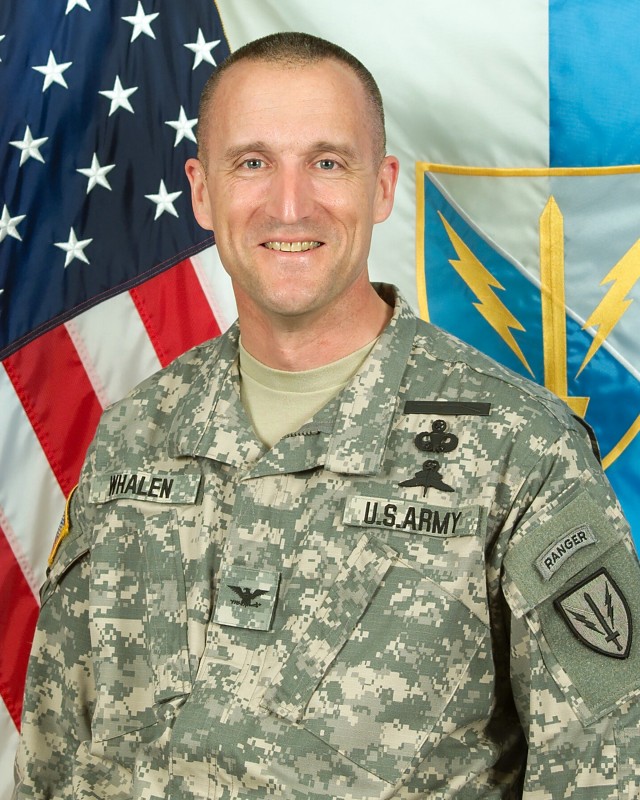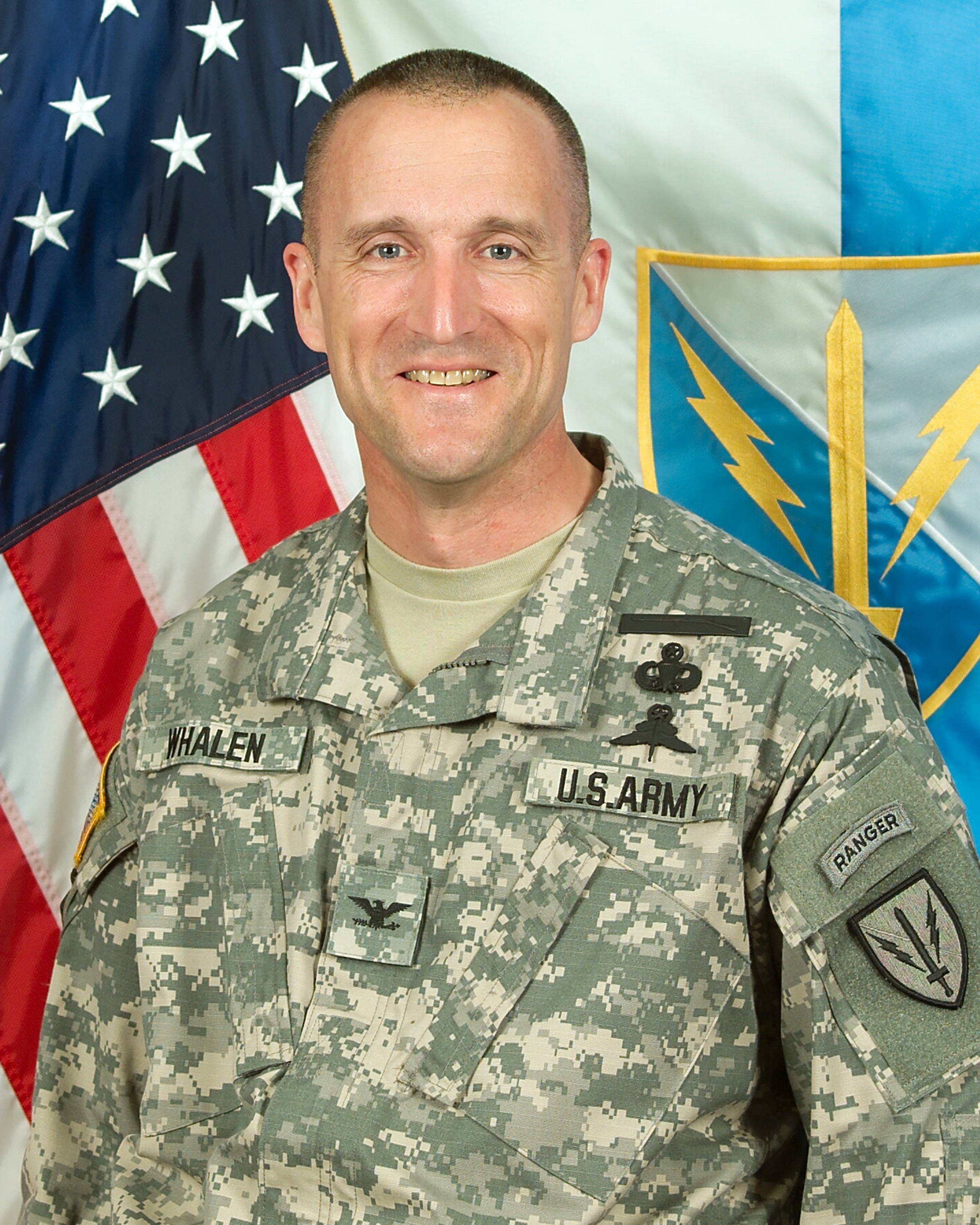FORT LEWIS, Wash. - It takes an impressive resume to command heroes. By objective accounts, Col. Robert P. Whalen Jr. owns one.
At the activation and change of command July 3 of the 201st Battlefield Surveillance Brigade, Lt. Gen. Charles H. Jacoby Jr. called the Soldiers arrayed on Watkins Field heroes - military intelligence specialists with real-world missions who "quietly and relentlessly work every day to defeat those who would wish to do this nation harm."
Their work informs the complex decisions of their leaders, Jacoby said, which accomplishes missions and saves lives.
The first decision-maker in their chain of command and new leader of 201st BfSB, Whalen brings unique qualifications to the brigade.
A Soldier equally comfortable in tactical and academic environments, Whalen speaks three foreign languages, holds three degrees from Yale and Oxford, yet volunteered for five tours in Korea and served as intelligence officer for a Ranger battalion and the Ranger Regiment.
He received a Deutsche Akademische Austausch Dienst scholarship, the German Academic Exchange Service, to conduct his postgraduate studies at the University of Kiel in Germany. He also jumped with the Rangers into Objective Rhino southwest of Kandahar, Afghanistan six weeks after the al-Qaida attacks of 9-11 as part of the vanguard for the war on terrorism.
He commanded a company that conducted peacekeeping operations in Haiti and commanded a battalion twice that executed its wartime intelligence-gathering missions in Iraq.
To relax during infrequent spare moments, he dives - in the ocean and out of the sky. He not only wears a master parachutist badge with two service stars, but is one of relatively few officers to earn a military free fall jump master parachutist badge. For his last two vacations, he traveled to Tunisia and Egypt to hone his Arabic reading and speaking skills.
Whalen grew up in Springfield, Va., the son of a Marine veteran of the Vietnam conflict. He had no designs on a military career, however, until he took a field trip to Cold-War era East Germany as a graduate student in 1980.
"I made a field trip to East Berlin that defined the word 'tyranny' in my mind," Whalen said. "It helped me to understand that the Army is a form of public service, too. I enrolled in Infantry basic training at Fort Benning six months later."
After three years as an infantry lieutenant, he took a break to obtain two degrees from Oxford. By the end of his studies, he had determined he wanted to continue his Army career; he spent hours and endless one-pound coins feeding an Oxford public phone, pleading with the Total Army Personnel Command to allow him back on active duty.
He was finally allowed to return, on the condition that he would transfer to the military intelligence corps.
"They never explained that," Whalen said, "but in retrospect it was probably a good thing."
Whalen said he was honored to spend tours as a Ranger battalion and regimental intelligence officer, a job with daily real-world challenges.
"At any given time, the battalion commander could walk into my office and say 'Bob, I've been looking at the traffic and there's a good chance that on Monday morning we could deploy to Timbuktu. What do you know about Timbuktu''" Whalen said. "Probably in no other battalion would you be called upon to do that."
The stakes are high for a Ranger intel officer. There is nowhere to hide if you make a mistake.
"You live or die with the quality of your analysis," the new 201st BfSB commander said of the Ranger S-2 job, "because after you brief the enemy situation at a target, then you and your Rangers personally helicopter in or jump in and deal with the enemy on that target. So if you get it wrong, you're surrounded by hundreds of angry Rangers asking (why). You face the music yourself."
He numbered studying his newest language last year among his biggest challenges, having been frustrated at his inability to read road signs or exchange greetings with leaders in Iraq.
"Arabic is tough," Whalen said. "I would compare it to having root canal surgery every afternoon for a year. (But like root canal surgery), learning Arabic is worth it."
Whalen was among the 300 colonels and lieutenant colonels selected for attendance at the Army War College last year, but further assigned as a fellow. Two hundred sixty-five attended AWC at Carlisle Barracks, Pa. last year, with 35 fellows reporting for duty elsewhere.
"We serve not at Carlisle, but in a federal agency or in a university like Harvard or M.I.T., or a think tank like Brookings or the Center for Strategic and International Studies," Whalen said. His duty station was the Central Intelligence Agency at Langley, Va.
Some of the most useful concepts in the Army have come from the think tanks, he said, such as the surge strategy implemented in 2007 in Iraq. The surge concept was developed, according to the MI officer, from recommendations by the private nonprofit American Enterprise Institute.
His academic performance and tactical experience have brought Whalen to a crucial point in the history of the Iraq conflict, for which he is grateful and energized. He feels his experience, including his recent stint with the CIA, will prove valuable in Iraq.
"A year from now I'll be leading a brigade with intelligence teams all over Iraq, from the Turkish border down to Basra in the south," he said. "We'll probably be working with and cooperating with the Agency as they do their work. It's very helpful to have somebody on the military side who can talk to agency employees by their first names, either real or fake, to work together to ensure our nation's security."
Whalen's 201st BfSB is the third active-duty surveillance brigade in the Army today. The 525th BfSB from Fort Bragg, N.C. is in Iraq now. The 504th, stood up a year ago at Fort Hood, Texas, and is in the final stages of manning and training before replacing 525th in the coming months.
"The Army realized somebody needed to follow the 504th," Whalen said. "That's why the 201st was activated and converted to a BfSB."
The new commander will turn his early attention to standing up a new long-range reconnaissance surveillance unit.
"We're going to create a long-range surveillance company, 145 guys, an airborne unit," Whalen said. "We're going to find the brightest, most resourceful Soldiers we can and train them and take them over to Iraq to perform those missions for a year."
The LRRS Soldiers will be led by an officer with the resume to understand their capabilities and the experience to best employ them.
Don Kramer is a reporter with Fort Lewis' Northwest Guardian.


Social Sharing